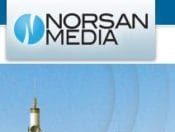 Pandora and ASCAP began a long-awaited federal trial 1/21 to determine how much the music streaming service should pay for the use of their compositions for the next two years. In September, Pandora won a Manhattan federal court decision rejecting efforts by some music publishers to narrow a license that enables the largest U.S. Internet radio service to play their music.
Pandora and ASCAP began a long-awaited federal trial 1/21 to determine how much the music streaming service should pay for the use of their compositions for the next two years. In September, Pandora won a Manhattan federal court decision rejecting efforts by some music publishers to narrow a license that enables the largest U.S. Internet radio service to play their music.
U.S. District Judge Denise Cote said an existing antitrust consent decree that requires ASCAP to license its works to Pandora from 2011 to 2015 “unambiguously” covers all its works, even if publishers seek to “withdraw” authority to license to “new media” services.
ASCAP has about 470,000 members, and reps music from artists like Leonard Bernstein, Beyoncé, Duke Ellington, George Gershwin, Alan Jackson, Jay-Z and Katy Perry.
The case arose after publishers including EMI Music Publishing Ltd, Sony/ATV Music Publishing and Universal Music Publishing Group withdrew or tried to withdraw new media licensing rights from ASCAP, allowing them to negotiate directly with Internet radio services.
Concerned that it would lose access to some music content for its roughly 72 million active listeners, Pandora in July sought a court ruling that publisher withdrawals would not affect the ASCAP license. In response, ASCAP argued that Pandora had understood that the consent decree license could be narrowed.
Cote, however, rejected its argument. “ASCAP argues that ‘ASCAP repertory’ refers only to the rights in music works that ASCAP has been granted by its members as of a particular moment in time,” the judge wrote. “Pandora argues that ‘ASCAP repertory’ is a defined term articulated in terms of ‘works’ or ‘compositions,’ as opposed to in terms of a gerrymandered parcel of ‘rights.’ Pandora is correct.”
ASCAP CEO John Lofrumento said in a statement that ASCAP members make their living creating the music without which Pandora would have no business: “The court’s decision to grant summary judgment on this matter has no impact on our fundamental position in this case that songwriters deserve fair pay for their hard work, an issue that the court has not yet decided.”
Pandora sued ASCAP more than a year ago seeking to pay writers and publishers less. The company argues that it shouldn’t have to pay ASCAP’s songwriters and publishers any more than terrestrial radio broadcasters do—currently about 1.7% of their revenue—since Pandora, which generates the bulk of its revenue from advertising, considers local radio stations its closest competitors.
“Until now, ASCAP has charged Internet-radio services either 1.85% of their gross revenue or 0.06 cent each time a user tunes in for a listening session, whichever sum is greater. Pandora has been paying an interim rate along those lines since 2011, in the absence of a deal with ASCAP over what it should pay through 2015,” noted a WSJ story.
Terrestrial stations pay royalties for airplay to songwriters and the publishers who represent them, but they usually don’t pay record companies or performers, save the deals CCME, Greater Media and others have made with Big Machine Label Group, Glassnote Entertainment Group, eOne, Dualtone, DashGo, rpm Entertainment, Robbins Entertainment, Naxos, Wind-up Records, Fearless Records, and Zojak World Wide.
Historically radio stations weren’t required to pay record companies for the use of their recordings, on the theory that airplay promoted sales. As sales have declined in recent years, labels have sought to begin collecting royalties of their own for airplay, with limited success. Record labels started collecting royalties for digital-radio play in 1995; the rates they command are set by the Copyright Royalty Board in Washington.
ASCAP says it should earn an even bigger slice of Pandora’s revenue than it does now. Its legal team is expected to argue that music is more valuable to Pandora than to terrestrial radio, since Pandora lacks sports and talk programs and plays far fewer audio ads.
Meanwhile Apple’s iTunes Radio, have agreed in recent years to license music directly from individual publishers at substantially higher rates than what ASCAP has been charging Internet-radio companies for blanket licenses. Apple, for example, has agreed to pay publishers about 10% of the revenue their catalogs generate on iTunes Radio, more than twice the share Pandora spends on publishing royalties.
ASCAP cites that higher rate as an argument in favor of raising its rate. Judge Cote will have to determine the rate Pandora would hypothetically pay ASCAP in a free market.
RBR-TVBR observation: The outcome of this trial could set a precedent for the digital music business, which now pays more to record labels and performers than to those who write and publish songs. Pandora pays a total of 4.3% of its revenue to publishers and songwriters represented by ASCAP and other organizations that collect royalties on their behalf. On the other hand, Pandora pays labels and performers about half of its revenue.




![An O’ahu FM Is Spun To Mark Paskin Honolulu, from atop Diamondhead [Photo: Adam R Jacobson/RBR]](https://rbr.com/wp-content/uploads/IMG_5581-2-scaled-e1586964084556-218x150.jpg)
